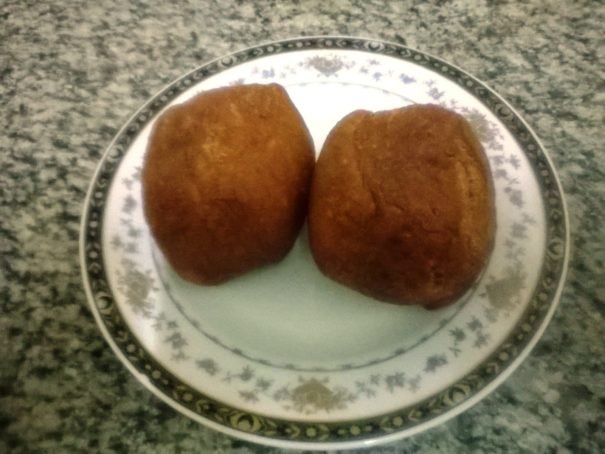
An Austere Breakfast That’s a Curiosity for Some, a Necessity for Others

An Austere Breakfast That’s a Curiosity for Some, a Necessity for Others
Kangumu in Nairobi
I see him standing by the side of the road, swathed in layers of clothing to ward off the morning chill. He keeps a watchful eye on the plastic bucket by his feet. It is sealed shut but transparent, and you can see that it is packed to the brim with kangumu. Day is about to break, and the morning trek to work has began.
Men and women stride resolutely towards their destinations in the emerging light, alone or in pairs, silently or engaged in animated conversation. Occasionally, someone darts towards the kangumu-seller and makes a purchase. I approach him. He greets me cheerfully and opens his bucket, wraps a plastic bag around his hand, dips into the bucket and with flourish, hands me a cold, hard kangumu.
A popular Kenyan comedian once described kangumu as the male version of mandazi. I can see why he came to this problematic comparison between these two types of deep-fried dough. Mandazi tend to be triangular in shape, their golden brown exterior easily torn apart by fingers to reveal a light, porous, white interior. Kangumu are a darker brown, and beneath their crunchy exoskeleton lies an inner core of hard, chewy, white dough. Whereas mandazi are soft and airy, kangumu are hard and dense. One of life’s greatest culinary disappointments is biting into a tantalizing mandazi only to find an inside that is more air than substance. Thus, in the quest for satiety, the kangumu, un-lightened and unsoftened by leavening agents, wins out.
Ngumu means hard in Swahili, and the ka- prefix denotes smallness. Literally, therefore, kangumu means a small, hard thing. Kangumu are hard to chew, but they are also a cheap and filling recourse for many with strained finances. As such, someone on Twitter shakes his virtual head at “yo yo” relatives and friends who think that eating kangumu is an adventure. It occurs to me that I am one of these yo yo’s, breakfasting on kangumu out of hobbyism rather than hunger.
In his childhood memoir Ake, Wole Soyinka describes guguru ati epa, a popular Nigerian popcorn-and-peanut street snack, as the friend and sustainer of workers during the critical countdown to payday. A handful of guguru washed down with a liquid accompaniment, and hunger was staved off for the rest of the working day. Kangumu is usually washed down with strungi: strong, black tea. Milkless and sometimes sugarless, strungi seems a fittingly austere accompaniment. I ponder over no-frills sustenance, over the difference between necessity and indulgence.
I stumble across a Kenyan catchphrase, an exhortation to fortitude: kaa ngumu kama kangumu. Stand firm like a kangumu. The kangumu-seller, bravely bearing the elements every morning to offer friendship and sustenance to workers on their way to work, becomes the embodiment of fortitude in my mind.